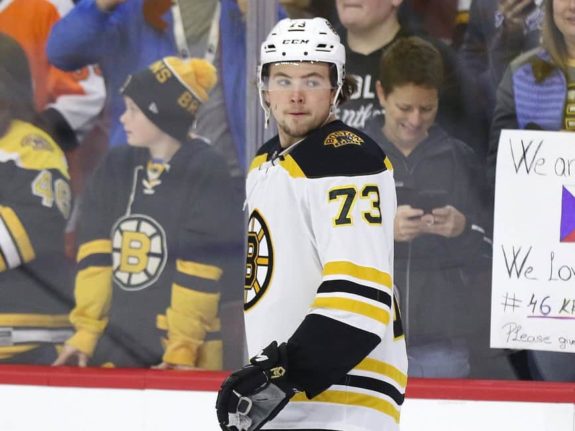It wasn’t pretty. Not at all.
For most of Monday’s contest versus the Dallas Stars, the Boston Bruins looked equal parts rusty, uninspired and just plain out-of-sorts. But after sleepwalking through the first 35-plus minutes of their Monday matinee the Bruins once again clawed their way back into a contest, extending their points streak to 13 games in the process before ultimately falling in overtime.
It was a slog. A grind. This, more than the uneven affair versus Montreal, looked like Boston’s first game back from their bye week. The rust was evident in nearly every facet of their game, as Boston was missing that “je ne sais quoi” from the opening puck drop all the way through Tyler Seguin’s pretty overtime winner.
Passes were either off the mark or bungled upon receipt. The power play was ineffective and non-threatening in a contest wherein one goal with the man-advantage would have been the difference between one and two points.
Even the best line in hockey was getting outplayed and outscored by Dallas’ top unit. Watching the Bergeron-Marchand-Pastrnak line get outplayed multiple shifts in a row is about as rare as seeing a snow leopard in the wild, finding out that it speaks English and bonding over your mutual affinity for mid-century architecture.

Regardless, it happened. And yet somehow, some way, in a game in which Boston looked completely discombobulated, they still managed to grab a point toward the standings.
No team will ever play 82-consecutive games in which they look excellent. And there’s most likely a losing streak somewhere on the Bruins’ horizon. But for now, this team’s resiliency and never-say-die mentality is shining on a nightly basis.
These Bruins, even on their worst day, are never out of a contest.
Here’s the good and the bad from Monday’s overtime loss:
The Good
Bruins Learning to Dig Themselves Out
Falling in a two-goal hole in and of itself obviously doesn’t constitute as a good thing. Developing a penchant for comebacks is, most certainly, a good thing.
Monday’s comeback was the fifth instance over the past 33 days in which the Bruins have erased a deficit to claim a point. In three of those contests they were down multiple goals. They’ve managed to scratch, claw and battle their way back both at home and on the road. It’s an encouraging and, frankly, unexpected development for a team featuring so many first and second-year players.

In recent years (and even during the halcyon days under Claude Julien, for that matter), this was not a franchise comfortable or efficient when playing from behind. Stylistically speaking, they were built to play with a lead: Jump out to an early lead, play suffocating defense, get pucks in deep, make smart plays, roll four lines, grab two points. With some notable exceptions, comebacks weren’t really the team’s forte.
Under Cassidy, Boston’s relentless and creativity-laden attacking style is more conducive to erasing a deficit.
Coaches and players alike would prefer to not make a habit of playing from behind. However, the belief in and knowledge of their ability to do so can only serve them well down the stretch and into the playoffs.
Making TD Garden Bloom Again
Julien’s final two seasons in Boston were largely marred by the team’s inability to enjoy any discernible home ice advantage. The 2015-16 squad posted a losing record on home ice, going 17-18-6. Prior to his firing, the 2016-17 squad also had a losing record at home, going 12-13-0.

Under Bruce Cassidy, the Bruins are 14-5-4 this season within the TD Garden confines and 25-9-5 overall. Monday’s effort, though ultimately in a loss, was the most recent example of the fact that Boston has once again become a difficult place to play.
Second Line Quietly Producing
With an all-star top line, a headline-grabbing third line and a fourth line beginning to accrue a cult-like following , Boston’s second line of Ryan Spooner, David Krejci and Jake DeBrusk has somewhat flown under the radar of late. Perhaps part of that has to do with their somewhat patchwork nature; an oft-maligned center playing out of position, a veteran center returning to the lineup after missing 18 games and, not least of all, a rookie.
Regardless, the trio have registered five goals and nine points over their last 5 games. The’ve cracked the scoresheet in six of the team’s last seven games. Their ability to gel and put pucks in the net have enabled Cassidy to justify leaving the top-heavy top line intact.

Their steady production continued Monday, with Spooner scoring the game-tying goal off a Krejci feed with DeBrusk paying the price in front of the net, screening Kari Lehtonen and out-battling Esa Lindell.
The chemistry and reliability being generated by the trio is a development which bodes well for Boston’s immediate future.
The Bad
Lost Scoring Steam?
As the Bruins traveled to Pittsburgh for their final tilt before the bye, they’d outscored their previous three opponents by a score of 17-2. In the nine games leading up to the break they’d built a goal-differential of plus-29; that’s better than a three-goal cushion per game.
Since the puck dropped in Pittsburgh the Bruins have gone to overtime three games in a row, losing twice at three-on-three and emerging victorious only via shootout. Though the team has continued to stash-away points even in losing efforts, their play over their last three contests has been in stark contrast to the manner in which they were blowing teams out of the building prior to their ill-timed respite.
Related: Will Bruins Bye Cool Down Hot Streak?
A downturn was inevitable; teams can only sustain such a high level of play for so long. However, if any bad habits or propensity to take shortcuts have crept into Boston’s game while the bounces were going their way it’s imperative that the coaching staff and players alike iron out these recent wrinkles before a points streak is followed by a losing streak; one frequently follows the other.
Power(less) Play
Boston’s power play once again put up a goose egg in a contest wherein one tally with the man-advantage would have been the difference maker. The unit almost turned completely negative, as Anton Khudobin was forced to bail out his teammates after a neutral-zone turnover led to a shorthanded breakaway for Radek Faksa.

Their goalless effort in four tries on Monday gives them just two goals over their last twelve chances. Prior to the December 30 contest versus Ottawa (in which the unit cashed-in three times in four chances) the power play had scored just once over its previous 14 opportunities.
A few eruptions with the man-advantage here and there have inflated Boston’s power play percentage and first-glance assessments of its effectiveness. Six of Boston’s 28 power play goals were scored in just two games.
Scoring is up this year, due in large part to rule-enforcement crackdowns, specifically as it pertains to slashing penalties. A more consistently-effective power play to go along with the uptick in opportunities will be integral to any hopes of a deep playoff run; it’s absence cost the Bruins a point Monday afternoon.
Bergeron Line Human After All?
For the first (and maybe the last) time this season, I have to write about the trio of Patrice Bergeron, Brad Marchand and David Pastrnak being outplayed.

Dallas’ top line of Tyler Seguin, Jamie Benn and Alexander Radulov got the better of Boston’s top dogs for the majority of the evening. Boston’s trio wound up with an 11-8 shot advantage, but were hemmed in their own zone with more frequency and regularity than we’ve grown accustomed to seeing.
Radulov’s second period tally came directly against the Bergeron line, off a face-off, extending Dallas’ lead to two goals. Though Seguin’s game-winner occurred with Pastrnak as the line’s sole representative on the ice, it was ultimately an afternoon in which Dallas’ stars shone brighter than Boston’s.